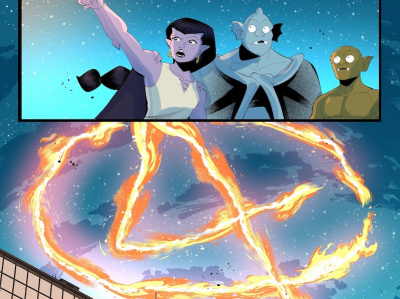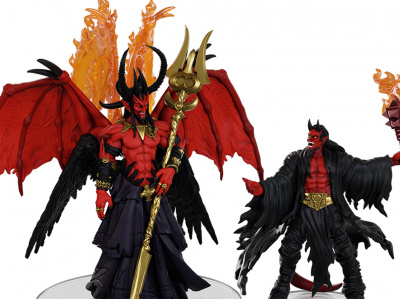Earlier this week, 4Kids Entertainment announced that its new Chaotic TCG and the associated Website would be marketed by separate companies established for the purpose (see '4Kids Announces TCG Initiatives'). In this two-part interview, we talked to 4Kids CEO Al Kahn and TC Digital Games CEO Bryan Gannon about their plans. In Part 2, we discuss the role of the TV show, the distribution of the game, how additional licenses might use the game engine, and more on the relationship between the online and real world game. In Part 1 (see 'Al Kahn and Bryan Gannon on Chaotic, Part 1'), we talked about the business structures being used, the way the online and offline aspects of the game interact, and what 4Kids will look for in additional licenses for the game engine.
How closely is the Chaotic game play incorporated into the TV show?
Kahn: The TV show certainly has the essence of the game play and kids who watch the TV show will understand the basics surrounding the underlying game play.
Gannon: The TV show brings the creatures to life, which is really kind of a new thing. In the Chaotic game, when you play online, you're playing with cards, and the cards come to life as creatures. In the TV show, the kids actually take the place of the creature, and play the ultimate roleplaying game where they battle with the strengths of the creature and as each user becomes different creatures, they gain more knowledge and more experience. So there is online game that occurs within the TV show, and it becomes a greater experience.
What is the target demo for Chaotic?
Gannon: The core group is 9- to 14-year-olds.
What do you see as the most important distribution channels for the game?
Gannon: There's a fine balance between the need for hobby and a nice strong retail experience as well. We believe our game will do well in both those marketplaces. We need to participate in both of those, to have the core hobby enthusiasts and the core hobby game play along with the strategic retail brand. We've met with both of those groups a considerable number of times, and in addition to that we've met with the key distributors that handle those retailers. They're very familiar with the Chaotic game play and the Chaotic game form and of course we spoke to them and told them we were going to come out with this company. The experience we've had with them has been overwhelming. Everybody has been in great support of this. We're looking to use those distributors and our partners to get to the right retailers, and the right hobby distributors.
One of the issues with TCGs is the size of the buy-in for a consumer to begin play. How will the buy-in for the consumer that wants to start playing Chaotic compare to the buy-in for other TCGs, such as Yu-Gi-Oh!, or Pokemon?
Gannon: It's pretty similar to Yu-Gi-Oh! and Pokemon. One of the things that we determined when we did our research is that the buying public, the kids that are tech savvy, are very used to buying trading card games, but then when it comes time to have to pay an additional fee to play an online game the enthusiasm wanes at this age level vs. an older level where World of Warcraft is able to do a big subscription agreement.
One of the very important tactics in our program is that for the price of entry into a normal starter deck you also get the price of entry into a very robust online game play. The pattern that we want to follow is encouraging the community and building the community and having kids be able to have online game experience in addition to what they would normally pay for the deck of cards or the booster set.
Will there be any advertising in the online game?
Gannon: There won't be any advertising directly in the game area. When you're in the gaming area, we want it to be a true game experience. We have a thing called the Noise Channel that we designed specifically for the online game, where we will place strategic advertising that follows what we believe the kids and users of online are interested in -- things that relate to gaming, things that relate to cellphones and wireless.
One of the really important parts of what we've done here is that we believe that there is a big trading card market in the physical world. We also believe that the kids and the players that are playing this trading card game are much more tech savvy than kids were just ten years ago. They're on MySpace, they're carrying cellphones, they're carrying Blackberries, they're communicating in a technological world, and they're in communities. We feel that we're bringing a marriage of the physical trading card world to the online technical savvy of the kids and we think that's a really important aspect of what we're bringing to them.
Do you envision incorporating other intellectual property into the game and the Website in the way that some other trading card game engines have been used to support play involving multiple IPs or will they always be separate and stand alone?
Gannon: We're building the engine to launch Chaotic, and the engine is on a proprietary platform and has some very important patents that protect it and create the environment that it's in. Once we successfully launch Chaotic and prove this engine, it is our intention to work with 4Kids to look at a very few select properties to do this with one or two more times, but we would intend to launch those properties as a stand-alone with their own environments so they can grow and be inside their own environments.
So they wouldn't join the Chaotic Website or be incorporated into Chaotic play; it would be stand-alone using the same engine?
Gannon: Using the same engine, but built, or uptuned, if you will, to have that other brand.
Will 4Kids ever be involved in TCGs that don't have online play, or is that the model that you want to pursue exclusively?
Gannnon: I don't think 4Kids will forgo what's been traditionally a very good experience for them. I do think that they see technology as the wave of the future and they want to be one of the first people to move in that direction. But I don't think that means they'll leave the marketplace that's done so well for them in the past. 4Kids wants to evolve with today's kids and as long as there are those two worlds, until they become one, they'll be involved in both.
In terms of the time that the consumer will spend, how do you think it will break down between real world play and online play?
Gannon: We're hoping for a number somewhere in the neighborhood of 40% online game play. In
In addition to that when you play offline in an approved environment in either a retail league or a hobby shop tournament, the points you achieve for that you'll be able to bring online and help you move your online scoring number up as well.
So we want to encourage traditional game play along with online game play.
When you said 'conversion,' you meant conversion from offline to online?
Gannon: Yes, conversion of offline points to online points. Let's say you play a tournament on a Thursday night at Neutral Ground (see 'The Ins and Outs of In-Store Gaming Events, Pt. I') and you score a certain number of points we want you to be able to use them as a recognized source and upload those points into the Web environment and let your ranking increase because of that.
You mentioned earlier that you were working on new expansions. Are those for Chaotic or are you already working on something related to other intellectual property?
Gannon: We're working on expansions for Chaotic and for growth of that game. There are already five years of experience on that game from before. We're improving each one of those years and expanding that, and potentially expanding it beyond five years. At the same time, it's 4Kids' core business to be looking at other properties and they'll continue to do that and now we'll have an eye on them for things that may make sense inside of this trading card company. But that will not be to the exclusion of what 4Kids traditionally does and if they have the right brand and the right property that doesn't fit into this trading card company they still have the ability to handle that and bring it to one of their traditional partners.
In other words if they were to pick Yu-Gi-Oh! up again tomorrow, they would still partner with somebody like Upper Deck if that's what made the most sense. Upper Deck's done a wonderful job with that brand.
Do you have SKUs and release dates?
Gannon: We haven't announced those yet, we'll be announcing those in two to three weeks. Spring is the general time frame.







